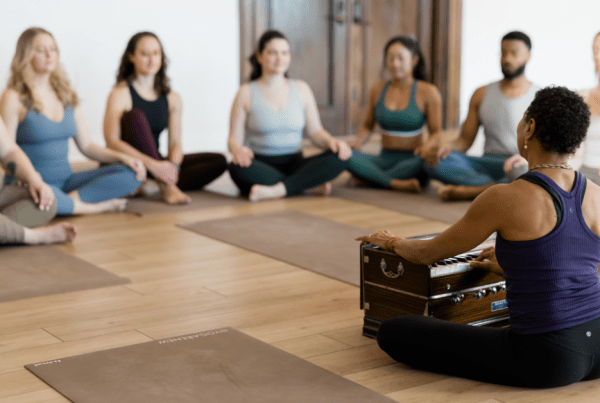
A lot of people who find themselves on a yoga mat or in a yoga teacher training have probably come to the yoga practice through the physical asanas.
The asanas, or the yoga poses, have become what we tend to associate yoga with. If you tell a friend that you’re going to a yoga class, they probably will assume that you’re taking a physical class that involves movement, breath, and maybe some mental focus. But, as you dive deeper into yoga, you come to find that yoga is actually way more than just physical practices. In fact, there’s a whole philosophy system behind it that’s literally thousands of years old.
Yoga philosophy is super important to the overall practice because it’s what helps you understand your mind, your soul, and why you’re here doing what you’re doing and what you’re meant to do.
The problem is the term “philosophy” can be a bit intimidating – at least it definitely was for me at first. Eventually, I started to realize how it wasn’t meant to turn me away or confuse me. In fact, as I started studying more about yoga philosophy I was actually gaining a greater sense of clarity because I was stepping into the workings of my mind and my body as well as studying the nature of my soul.
Finding a deeper path in yoga and in life
Yoga philosophy helped me connect to my purpose in life and also helped me tap into my ability to experience bliss and regain control when life sometimes knocked me off my feet. It’s how I learned I can connect to my true self and attempt to see that in all beings around me.
What’s exciting about yoga philosophy is that these concepts that can seem complicated at first are actually super simple and can be applied to literally anything and everything in your life both on and off the mat.
Let’s take a look at some of the key concepts that make yoga philosophy so relatable.
“I am not my body or my mind.”
When you dive into the core concepts of yoga philosophy, a common thread that runs through the teachings is that you are not your body or your mind. This might sound a little scary or strange at first, but when you unpack this concept, it’s actually very comforting. From the perspective of yoga philosophy, you have a body and you have a mind, but you are actually a soul.
Your soul is having a human experience here and you are moving your body around the same way you drive a bike or a car. If you don’t take care of what you’ve got, you will have a lot of trouble moving through this lifetime in a balanced way because you aren’t connecting with your soul.
Connect with the soul and cultivate compassion
In Sanskrit, which is the language of yoga, there are many different concepts used to understand the soul. Some of these concepts are: jiva, atman, purusha, and drastuh.
Anything that is born, grows, reproduces, and dies is a soul. This teaches that humans, plants, and animals all have souls and when you understand this concept, you can begin to cultivate a bit more compassion towards all beings.
When you recognize that you are living amongst other souls, you can connect with them, and with nature, in a more elevated way that keeps you focused on how eternal, wise, and blissful you really are. The soul is eternal, full of wisdom, and blissful.
The deeper you dive into yoga philosophy, the more you find the teaching that the soul is “sat chit ananda” which means eternal, full of wisdom, and blissful.
When you realize that this is what you are, you may begin to realize that the temporary problems in life aren’t that bad. If you are a soul that is eternal, then maybe losing that job isn’t that big of a deal because it doesn’t define who you are in terms of our eternality. If you are a soul that is full of wisdom, then you can begin to look within yourself for the answers you’re seeking. If you are a soul that is blissful, then any time you experience some kind of suffering, you may be able to understand that it’ll be temporary because that’s not your true nature and you have the ability to reframe you experience.
Samskaras: Impressions made on the mind
Since the mind is something you have, not something you are, you have the ability to control the way you take in information and how you see the world. From the time you’re born, you begin to create stories and belief systems that are very specific to us as individuals.
For example, if someone had a frightening experience with a dog when they were a child, they may grow into an adult who believes all dogs are scary. This isn’t the truth, but for them it is. Yoga philosophy teaches you that you can control the way your mind responds to the feelings and thoughts that come up and recognize that your experiences is specific to you as an individual. These experiences may not be the actual truth and you have the ability to move beyond false impressions to begin to see what is actually happening.
Since the mind is malleable, you aren’t stuck with the impressions that you currently have. Yoga philosophy teaches that you have the ability to change the way you think and you also are empowered to mold your mind to be a tool that works with you, not against you.
We all have samskaras, which are impressions made on the mind over time. You can think of the mind like an ice skating rink and the marks the skates make on the ice are the samskaras. They’re engraved into the ice for some time, but if you own the ice rink, you have the ability to call in the zamboni to smooth the ice out.
You have this ability to do the same with your thoughts, beliefs, and past experiences. You also have the ability to choose what marks you make on your mind.
The 3 parts of the mind
Yoga philosophy shines a light on the various areas of the mind:
- Manos: The first part of the mind is the manos mind and it’s where your primal instincts are. It’s where you understand that you need food, shelter, and a way to stay alive.
- Ahankara: The second part of the mind is the ahankara, which is where you often forget that you are a soul and you have a body. It’s where you think you are the color of your hair, the car you drive, and the job you have. It’s where you think you are the body and the mind as opposed to being a soul.
- Buddhi: The last part of the mind is the buddhi, which is where your ability to discern is and where your intellect lies. This is the part of the mind that helps you recognize that you are a soul having a human experience and all experiences are happening for you.
Life is happening for you, not to you
At the heart of yoga philosophy, there’s a concept that everything happening in this lifetime is happening for you and not to you. Every person you meet and every experience you have is meant to help you understand and connect to your soul.
When you have a negative experience, it’s meant to help you realize that this world and your brain and body are temporary because you are a soul that is eternal. You are moving through this lifetime on this planet as a human being in an attempt to connect to what’s eternal and everything you experience is here to help you realize that.
Yoga philosophy is about cultivating the tools to live this life to its absolute fullest. It helps us understand that you are meant to have an experience in this lifetime that connects you to your truth and to who you are. It helps you understand why sometimes you’re sad or angry and it provides you with the tools to empower yourself to live a life you love and make connections with people and situations that bring you up instead of down. The more you study, the more you can stand in your own truth and not be swayed by the things that bring you down.
The yoga asana, or physical practice, is beautiful and important, but if you’ve ever tried to get through a yoga or meditation practice right after having a bad day at work or having a fight with a friend or partner, you probably didn’t have the best practice.
When you’re able to understand how your mind and how it works, you can begin to control how you experience and how you respond to the things you cannot control. You can’t control what happens to you in this lifetime, but you can control the way you react to it and you can also control the way you process these experiences. When you’re able to do this, you’re able to live a more blissful life.
Understanding yoga philosophy is integral to the practice
Yoga philosophy was what elevated me from thinking that yoga was only about the movement and going to yoga classes. It made me realize how much more there is to this human experience and how much more I can open my heart to the blissful things in this world during this lifetime.
And the best part is that as a teacher, it’s easy to share about yoga philosophy in your yoga asana classes. The Dharma talk is the perfect way to tell your students about the philosophy concepts you feel most connected to.
Dharma talks are kind of my thing, and I put together a guide with everything I know about giving great Dharma talks in my totally free Dharma Talk Starter Kit. Download the guide now to see how you can incorporate the philosophy of yoga into your teaching!










